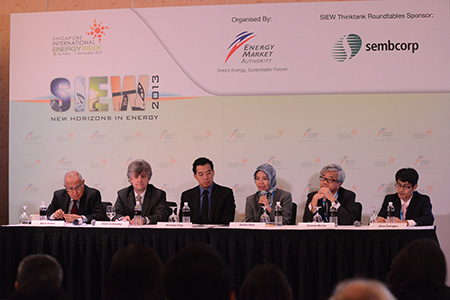
Ambassador Barry Desker, Dean of the S. Rajaratnam School of International Studies (RSIS); Dr Andrii Gritsevskyi, Energy Systems Analyst, Energy Planning and Economic Studies Section at IAEA; Mr Nicholas Fang, Executive Director of the Singapore Institute of International Affairs; Professor Dato’ Dr Aishah Bidin, Dean, Law Faculty of Malaysia National University; Dr Kumiaki Muriya, Senior Chief Engineer, Nuclear Energy, Hitachi-GE; Dr Zhou Zhangqi; Assistant Director at Sunshine Law Firm and R&D Director, Sunshine Energy at Resources and Environment Centre China discussed a possible nuclear model that would suit the needs of the Southeast Asia region.
More than two years on from Fukushima, nuclear energy experts gathered in Singapore yesterday to discuss the enduring impact of the accident on nuclear governance and to outline a possible nuclear model that would suit the needs of the Southeast Asia (SEA) region.
Moderator Barry Desker, Dean of the S. Rajaratnam School of International Studies (RSIS), opened the discussions by framing the current state of nuclear energy developments in the SEA region.
Amongst the ASEAN countries, Vietnam was the most advanced in realising its nuclear energy ambitions. He said the “revival of nuclear energy was a response to energy security, on the back of robust economic growth, urbanisation and rising fuel prices in the region”. He added that “Fukushima demonstrated the trans-boundary consequences of a nuclear accident and the need for nuclear governance cooperation”.
Discussing the topic of “Global Trends in Nuclear Energy Policies and Its Impact on the Security Landscape in Asia”, a common theme that resonated amongst the panel was that transparency and legal frameworks were important factors for nuclear governance.
The panel comprised Dr Andrii Gritsevskyi, Energy Systems Analyst, Energy Planning and Economic Studies Section at IAEA; Mr Nicholas Fang, Executive Director of the Singapore Institute of International Affairs; Professor Dato’ Dr Aishah Bidin, Dean, Law Faculty of Malaysia National University; Dr Kumiaki Muriya, Senior Chief Engineer, Nuclear Energy, Hitachi-GE; and Dr Zhou Zhangqi, Assistant Director at Sunshine Law Firm and R&D Director, Sunshine Energy at Resources and Environment Centre China.
Mr Fang touched on the recently concluded nuclear pre-feasibility study for Singapore. While the study had recommended that nuclear energy was not an option for Singapore yet, he commented that the study had not sought public inputs. He commented that citizens in Singapore were not fully aware of the pros and cons of nuclear technology and consultation was important since policy-making required the addressing of public concerns.
Dr Aishah added that there was a need to have a “sound, legal and regulatory framework” as well. She noted that while there was no green light for nuclear energy in Malaysia yet, it was important to maintain cooperation amongst ASEAN member states. The major challenges for a newcomer in nuclear energy were public acceptance, international and local cooperation and adherence to legal instruments, she said.
Dr Zhou Zhanggui gave the example of China where there is currently a significant number of nuclear power plants and said that China would be expected to increase the use of nuclear energy in the future. Therefore, there was an “interest in public perception and operation” of nuclear energy from a government standpoint and information on nuclear energy must be transparent as there was little public awareness of nuclear technology at the moment.
By : Lionel Choo, EMA